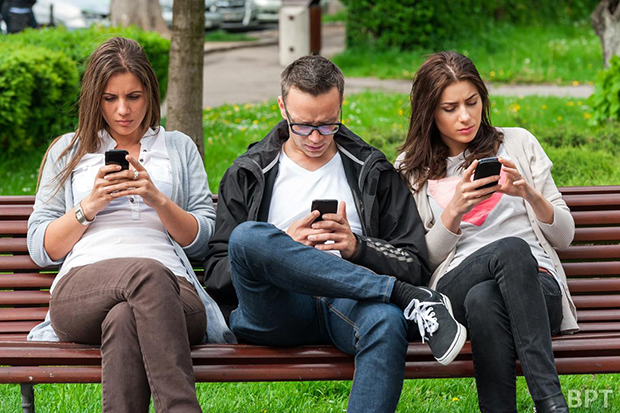
Everyday technology consumes everyone’s lives as the phone, computer, tablet, and other high-tech devices have become not just an object, but also a close companion. And for those who are extremely connected to their devices, going without them, even for only a few minutes, can be an anxiety-filled experience.
A majority of American adults (56 percent) own smartphones, according to a recent study by the Pew Research Center. Having the ability to check your mail, play games, and browse the Internet right in your pocket is a leap forward for technology and staying connected to the workplace, but it may come at a cost.
Nomophobia, or the pathological fear of remaining out of touch with technology, is a relatively modern affliction. It’s basically a side effect from changes the mobile phone has made to human habits, behaviors and even the way we perceive reality. Entire relationships are becoming defined through mobile texting and colorful little emoticons, from saying “I love you” to “I think we should move on.”
So how did it come to this? Have smartphones become an extension of Americans or is everyone simply becoming victims of a fast-paced, always connected society? Chances are it’s a little bit of both.
Dr. Chuck Howard, licensed psychologist and chair of the psychology programs at Argosy University, Denver, believes it can be more complex than simply stamping a label on the problem.
“Nomophobia is a result of people becoming more and more electronically connected to the point that their technology-based network and relationships become their home community,” says Howard. “Losing that connection is essentially a form of electronic banishment. They fear being tossed out of, or losing, their ‘social village.’”
The term was originally coined from a 2010 study by YouGov, a UK-based research organization who wanted to look at anxieties suffered by mobile phone users. The study found that men and women often felt stressed when their mobile phones were turned off.
“Nomophobia can be a symptom of a potential addiction,” says Howard. “Users who are happy and having a good time when on their device, but then face great stress and anxiety without it. They may obsess about it. They can’t put it down. This is when actual addiction becomes a threat.”
When you see a behavior becoming destructive, and admit to having a problem, you can handle it in the same way as other types of addiction. “Develop strategies for meeting your social needs in other ways… without depending on an electronic platform,” suggests Howard.
Start by resisting the urge to constantly check your phone. Try limiting your number of mobile social media networks and consider joining more in-person professional networking groups or sports clubs. Set aside some time to leave your phone alone, such as at dinner, with friends, or going to sleep.
If it becomes an addiction and begins to strain your relationships, consider asking others around you what they think. Be open to a sort of intervention where friends and family may candidly tell you their thoughts. No need to go cold turkey, just take some small steps at a time to disconnect and enjoy the world around you, without looking through a smartphone screen. And lastly if you can’t do it alone, then seek professional help.
Content by Brandpoint

